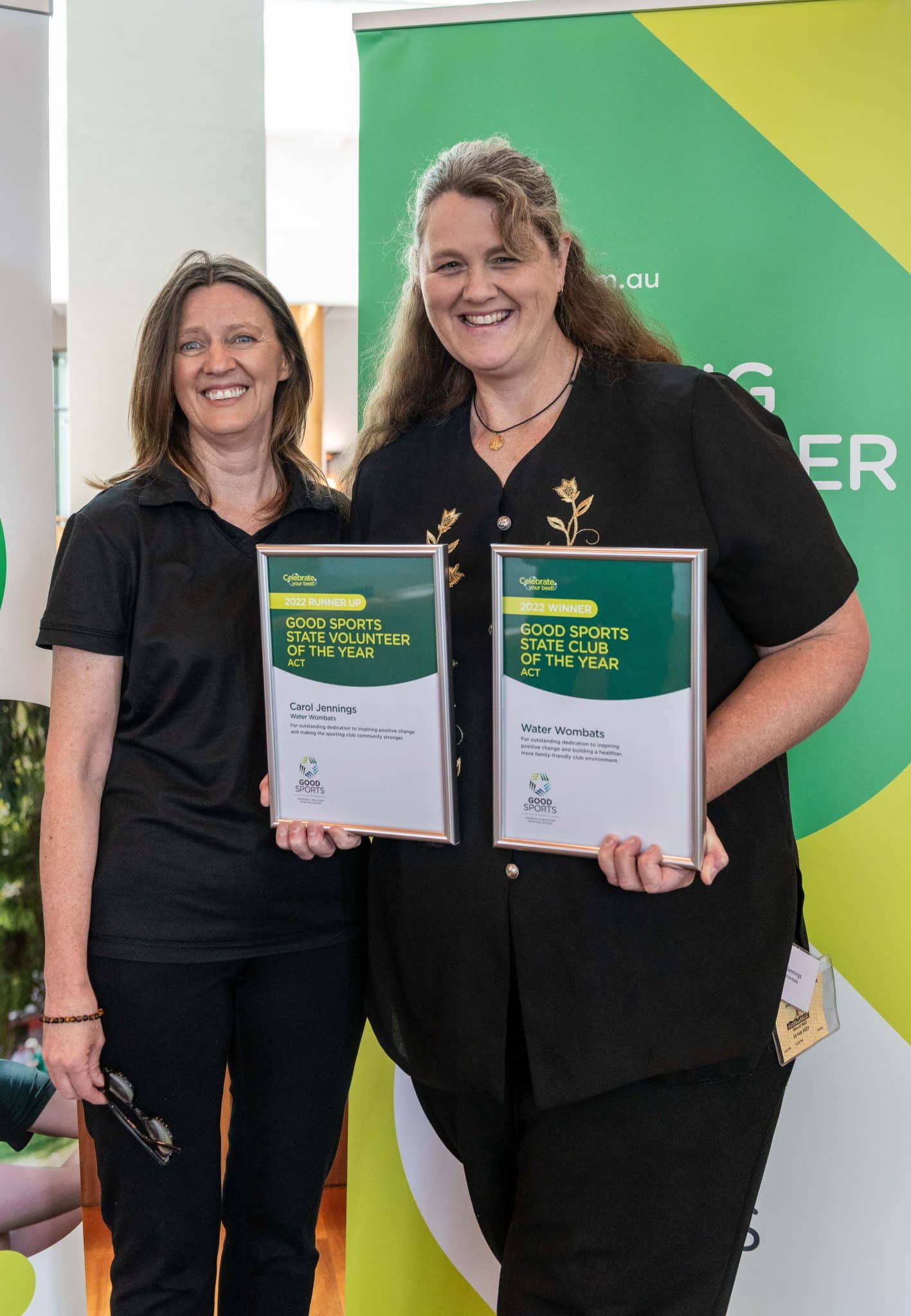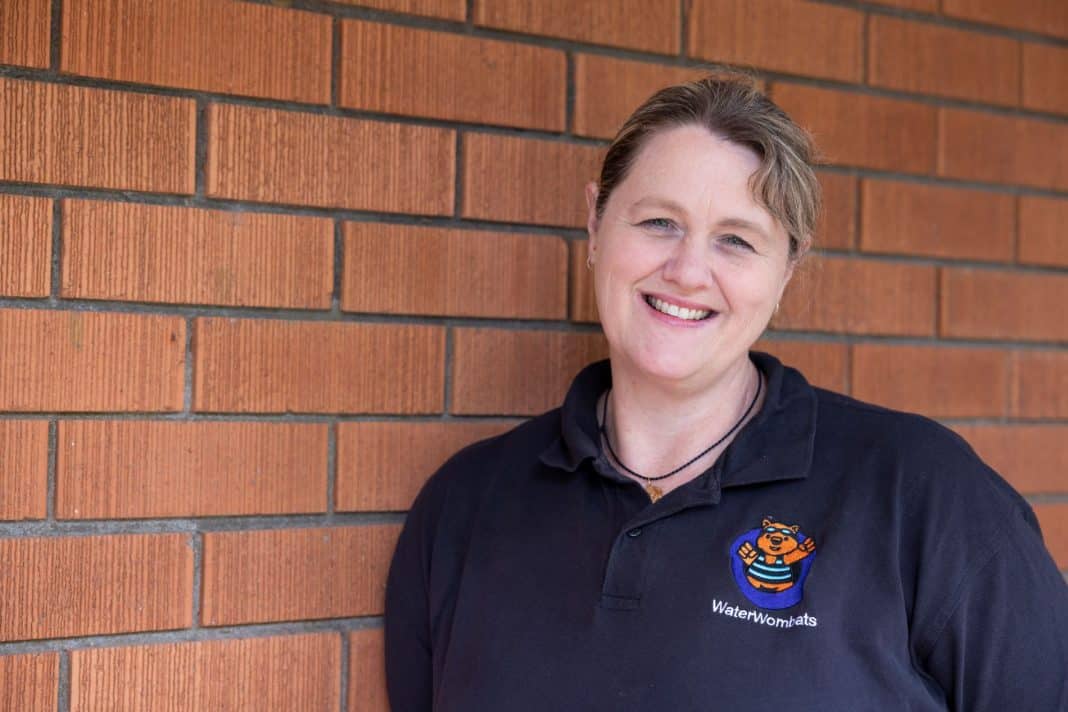With the splashing, loud noises, and new sensations, learning to swim can be an intimidating experience for any child. Add to the mix a neurological or physical need, and the experience can be overwhelming. Water Wombats is helping Canberra’s children with additional needs, anxiety, and those who just need a helping hand, learn to be safe in and around water.
Canberra mum Carol Jennings has today been recognised at the Good Sports Awards 2022 for the work she and the Wombats team do to help children of the region. Water Wombats took home the ACT Good Sports Club of the Year award, while Ms Jennings was also announced as the runner-up for the ACT Good Sports Volunteer of the Year. The awards are organised by Good Sports, Australia’s largest community sports program in recognition of community sporting clubs and their volunteers.
Inspired after she experienced firsthand how hard a mainstream swim school could be for a child with additional needs, Ms Jennings decided to help others in the same position.
Two of Ms Jennings’ three children are on the autism spectrum. It was after the diagnosis of her eldest son that she did a deep dive into what autism was and what challenges were to be expected. She says a few years ago, she decided teach children the way they learn.

“He really struggled in mainstream swimming programs because of his inability to focus with the noise, the environment, and the way the instructions were given,” she says.
The more she and her son struggled in the class, the more she thought they weren’t alone in it. She says the drowning statistics have shown children with autism, and disabilities in general, are more likely to drown; the statistics are frighteningly high, and they seemed to be the children that missed out on learning the skill.
“Children with autism are three times more likely to drown than their neurotypical peers. On average, there are eight non drowning incidents every week, then there’s a lot not reported.”
Ms Jennings says the hardest thing for her was being told that your child is not going to achieve much in life. She said she couldn’t believe it; her first born was so bright he taught himself to read before he was two. Now at nine years old, he is enjoying mainstream schooling with the friends he has made.
“It comes back to believing in your child and having that network and having the right services in place, and fighting and advocating that you don’t just settle. You set those expectations and they can rise to them, they can grow and change and develop just like neurotypical kids,” she says.
Launching last year after a few years of getting her ducks in a row and doing research, Water Wombats operates three days a week at the University of Canberra Hospital’s hydro pool. The space is perfect for her students as it has a ramp, a chairlift, and a hoist, says Ms Jennings, who is grateful for the support she has received from the organisation.
“One in five people have a disability and the services for those one in five are pretty limited. That’s why we need to do more in this space,” she says.
Not a huge fan of labels, Ms Jennings understands sometimes they are necessary, especially when it comes getting services and funding. She says the program helps children with ADHD, anxiety, neurodevelopmental disorders, cerebral palsy, Down syndrome, and autism. They have recently become Puggles certified, so they can do key signs to help hard-of-hearing children.
Children with limb difference can also benefit from the program as the instructors are trained in Halliwick. Heading to the UK in April to do the advanced training, Ms Jennings says she will be the only internationally certified Halliwick instructor in Australia.
“It works with children with mainly physical disabilities, so missing a limb, paralysed limbs, and things like that. We look at buoyancy and density with the body so they can float and move with ease.”
She says Water Wombats also has training in Watsu, which is essentially a water-based shiatsu, focusing on physical therapy, relaxation, and stretching of the muscles.
Water Wombats has four swim instructors on board and are in the midst of recruiting. They are all swim teacher certified, come from different backgrounds and have different strengths, such as expertise in exercise physiology, physiotherapy, or psychology.
“When I get those children in, I look at their personality and what they need and I try to then match them with the right instructor so they can form that relationship and build the trust.”
Ms Jennings was a qualified swimming instructor before Water Wombats. She has always been motivated to see people know how to swim, especially living in such a water focused nation.
“We’re a water nation and these kids should have the opportunities to join their peers at the pool or go to the beach or go to the playground,” she says.
Even in Canberra, most of the playgrounds are near ponds and it only takes a short amount of time for a child to get into trouble near water, she says. Along with trying to combat these concerns, she it was the holistic benefits that drew her to teaching swimming.
“It works on hypertonia, core strength, balance, coordination, which a lot of kids also struggle with. It’s good for mental health, it’s good for physical health, it’s just such a well-rounded activity that they can do alone and together.”
The aim of the Water Wombats program is water safety and survival strokes. When students are confident and ready, they can transition to a mainstream swimming program to develop more skills.
Success in the program looks different for each child, which is why sessions are tailor-made. One parent might have the goal of knowing that their child is safe around water, while others might have a shared goal of going to the Special Olympics.
Ms Jennings invested the initial funds to start the program, and has since received a couple of community grants, support from the Panadol Care Collective. A registered charity that accepts donations and sponsorship, Water Wombats is hoping to attract more sponsors so they can offer more services and continue to help those who otherwise might not be able to afford sessions.
“We work with vulnerable children, that come from care and protection background, low socioeconomic backgrounds, that can’t afford programs and we sponsor them,” she says.
Water Wombats has been a labour of love for Ms Jennings, who earns no income from her position. She says seeing the achievements of some of the children not only warms her heart but reminds her why she does it.
One of her students had food sensitivities and his parents were struggling getting him to eat; he found the right motivation in his swim classes.
“He comes to the program and he loves it so much he says, ‘well, I need to eat because I want muscles and energy to learn to swim’,” smiles Ms Jennings.
Find out more about Water Wombats at waterwombats.com
Get all the latest Canberra news, sport, entertainment, lifestyle, competitions and more delivered straight to your inbox with the Canberra Daily Daily Newsletter. Sign up here



